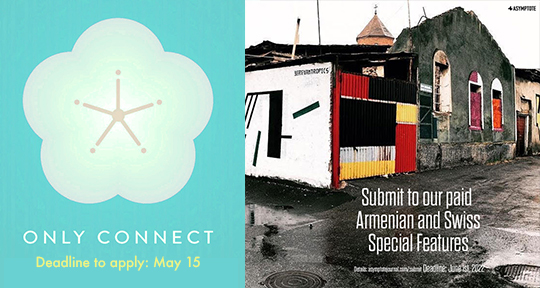Welcome to our Spring 2022 edition, released just as Russia’s invasion enters a brutal new phase. We’ve been curating a space for writers in support of Ukraine in a new Saturday column. Now, we proudly bring you Andrii Krasnyashchikh’s letters from Kharkiv, Kate Tsurkan’s interview with Zenia Tompkins, and Ian Ross Singleton’s review of Words for War: New Poems from Ukraine. Complemented by guest artist Shuxian Lee’s poignant cover, these pieces and the new issue remind us that if “humans are destructive”—as frequent contributor Theis Ørntoft puts it across so powerfully in his essay “Our Days in Paradise are Over”—“we are also an organising phenomenon in the cosmos.”
An absolute highlight amid new work from thirty-four countries, Ørntoft’s essay is itself an organizing phenomenon that deserves to be dwelt on. According to him, civilization “began with the delineation of a garden,” but capitalism has taken it to the point where every inch of planet Earth has been altered and nature no longer exists “out there”—no wonder, then, that his expedition to the West of Jutland yields zero sightings of wolves. Heavily mythologized across cultures, wolves most often represent danger, chaos, the unknown—yet, in the author’s telling, they also stand for the primeval and, therefore, a certain elusive real, in stark contrast to the various symbolisms thrust upon them. Ørntoft then inverts the anthropocentric paradigm that humans are used to—with them at the top of the food chain, even though they do not necessarily self-identify as animals—and asks us to consider what message wolves might hold for us instead.
Apart from Nina Yargekov’s uproarious adaptation of “Little Red Riding Wolf” for the age of the #MeToo movement—the obvious story with which Ørntoft’s nonfiction might be paired—“Our Days in Paradise are Over” echoes Nobel laureate Hermann Karl Hesse’s empathetic Weltanschauung in two new translations of his poems by Wally Swist; it also asks us to pay attention to the various animals conjured in this edition: from the suffering, captive bat in Bosnian author Aljoša Ljubojević’s “How We Started the War” to the suffering, liberated “Fish” in Georgian writer Goderdzi Chokheli’s story about a man who jumps into a lake and renounces his very own humanity along with the social contract it entails. Then there is the elusive boar in Pedro de Jesús’s slippery poem, in which various hunters discuss the “art of the hunt” only to miss the point; the cats with beautiful eyes in Agnieszka Taborska’s fascinating piece on surrealists vis-à-vis their chosen suicides, “yawn[ing] and stretch[ing] in all their dignity, distance, and above all their enormous indifference to the person standing there on the chair with her head in a noose.” READ MORE…




